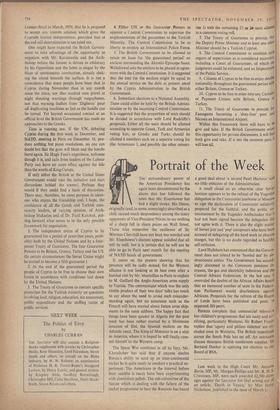We tend here to think of the press as some-
thing independent of, occasionally even menaced by, advertising. A few days in the US is enough to show how utterly false this is—and the incalcul- able extent to which the British press has suffered by the growth of restrictive practices and, still more, by the decline of the atmosphere of competition. An American grocer who decides to take a cent off the price of a can of beans takes a page to acquaint the public of that fact; and because enough people are attracted thereby, he makes enough to pay for the advertisement and to get rid of his stocks. It is as simple as that; suggesting that the first step on Fleet Street news- papers' painful road back to prosperity is an in- tensive campaign against restrictive practices— beginning with their own.
Advertising, I should have mentioned, is more than competition between different firms; it be- comes competition between different sections of the same firm—the short-termers and the long- termers. Their dissonance was admirably summed up in a New Yorker cartoon recently, in which a board of car manufacturers was pictured con- gratulating itself on its latest model before pass- ing straight on to next'business : how to render that latest model obsolete. The Americans have developed to a fine art the technique, previously monopolised by couturiers, of making 1957 lines look unfashionable in 1957, and thereby securing the maximum turnover for 1958 models.
Cars ! I came prepared for it, but the chief visual impression made by the country was of the dominance of the automobile in travelling, in shopping, and even in eating and sleeping. Motels are appearing in stray places in Europe; in America they are everywhere. Ranging from two to fifteen dollars a night, they provide an endless Everything possible, in fact, is done to save people getting out of their cars—except to sell them. Whole streets are lined with second-hand markets, until the impression is left that the in' habitants live by taking in each other'sus " ed automobiles.
This is why American town planning can never do more than touch the fringes of architectural design. With garages, second-hand car marts, car mortuaries, motels and parking spaces for all the various commercial enterprises, the horizontal spread of sprawling crapulous-looking districts i5 hardly possible to avoid. The first essential, after all, of a filling-station or a motel is to impinge on the motorist's eye; they cannot be discreet. On the approaches to some towns I even found that the moteliers and fillers had actually coil' spired to lure the motorist off the quickest rot le, where it might take him on some bypass or free' way avoiding them; they had put up signs saying 'shortest' or 'most direct' or 'scenic' route to 114 town, to ensure that he went their way.
But perhaps the most striking indication I of the ascendancy of the auotoniobile was Lubbock, Texas. The Tech. there—a univers in all but name—had about 8,500 studer Between them they have over 5,000 cars.
They're At It Again
ad in itY














































 Previous page
Previous page